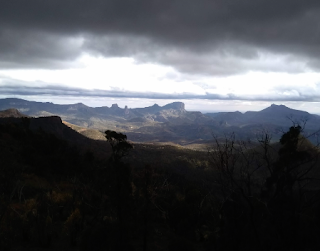In Central West NSW we have had relatively few positive cases of Covid 19 until now, but all this has changed almost overnight. In our local town there are, of today, 9 cases and some have been infectious in the community. Testing numbers are alarmingly low and the threat has become very real. It has also been quite difficult to obtain Covid Vaccinations locally until last week, with overstretched and inadequate GP services being the only sources. My husband and I chose to travel 125 kms to another town back in May to obtain our first AstraZeneca dose and had to do the same just over a week ago for the second dose, before the two local Pharmacies and an ADF pop-up clinic came on line last week.
Tuesday, 31 August 2021
The thing that you have dreaded has now come to pass
Thursday, 12 August 2021
Just do the next thing
In current times it can be difficult to stay focused and motivated and, instead, we can just drift into letting days flow slowly past in a state of brain fog. When this happens, I have found it helpful to go into "just do the next thing" mode to maintain some sense of achievement in my days. The benefits of this can be as follows:
It doesn't matter how long a task takes
It reduces procrastination
The pressure is taken away
Anxiety is reduced
Regular routines can be incorporated
Or we can just stay in randomness
A caution
Remember: Every morning brings new potential, but if you dwell on the misfortunes of the day before, you tend to overlook tremendous opportunities. Harvey MacKay
Saturday, 9 January 2021
When the walls start closing in
Today I have read articles about how we are only at the half-way point of the marathon of living with Covid 19 and, in Australia, our hopes for a better 2021 have been dashed by new outbreaks and concerns about the new more contagious variant of the Virus. All of this can leave us feeling that the walls are closing in again, especially if we have been placed in lock-down or been told to isolate due to places we have unwittingly visited. It can feel a bit like groundhog day!
However, these are some of the things which I have found helpful when I have felt the walls beginning to close in on me:
Looking out
Looking up
Giving it to God
Changing deprivations and restrictions into acts of love
Remember: Healing isn't about overcoming the pain; it's living despite it. Hannah Blum
Thursday, 2 January 2020
My year of healing: part one: personal healing
As I now reflect back on 2019, I can see the progress that I have made in both areas, and the wonderful resources I have been led to along the way. These are the resources I would like to share now.
Mindfulness Courses
Meditation Resource
Gratitude App
Abuse from a Narcissist
Remember: Hope smiles from the thresh-hold of the year to come, whispering "it will be happier...." Gratitude App.
Saturday, 18 May 2019
Walking through the rain
Remember: The secret of change is to focus all your energy, not on fighting the old, but on building the new. Socrates
Wednesday, 9 January 2019
When life creates the perfect storm
When we feel like we are drowning
What are our anchors
Islands of refuge/ respite
Storms eventually ease
Afterwards
- What have we learnt from the storm?
- What clouds were gathering before the storm hit? (Signs that it might be coming).
Remember: God won't take it away, but God will give you the peace to get through it (Touched by an Angel DVD)
Thursday, 13 December 2018
Being re-traumatised
These are the things that I have found helpful in beginning to recover:
Give yourself time
Externalise the reactions
http://reflectionsofaruralsocialworker.blogspot.com/2015/04/whirlpool-thinking.html
http://reflectionsofaruralsocialworker.blogspot.com/2015/08/offload-writing.html




















































